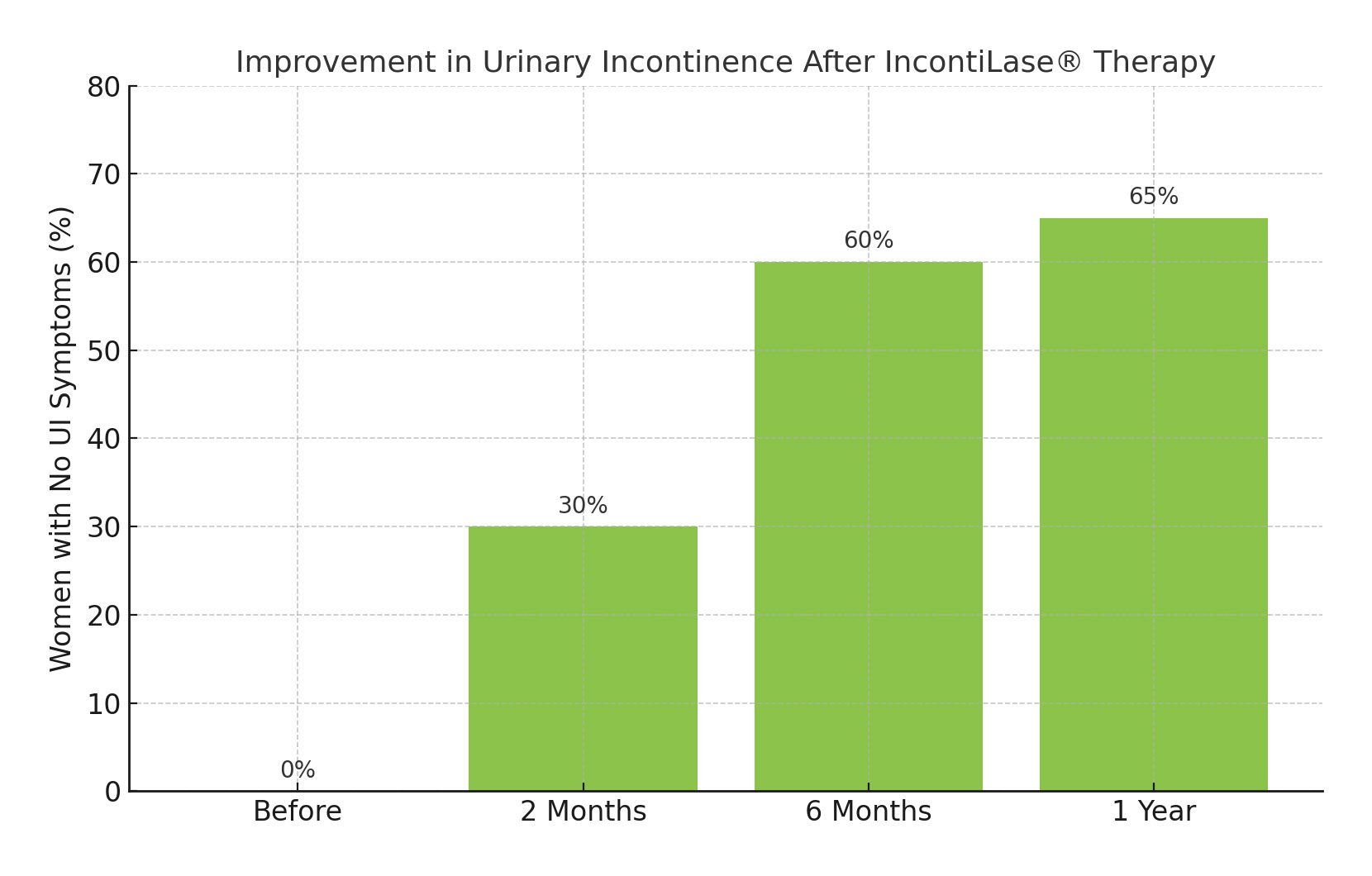Female Incontinence
A non-surgical laser solution for stress urinary incontinence – quick, painless, and effective
IncontiLase® is a non-invasive laser treatment designed to improve mild to moderate stress urinary incontinence (SUI). Using advanced Er:YAG laser technology, this treatment strengthens and tightens the vaginal walls and pelvic floor by stimulating collagen production, providing better support for the bladder.
Unlike surgical options, IncontiLase® requires no incisions, no anaesthesia, and no downtime. Most patients experience significant improvement after just one or two sessions, restoring confidence and improving quality of life.
SUI and Treatment Options
If you find yourself avoiding certain activities out of fear of leaks, or feeling embarrassed by unexpected bladder control issues, you’re not alone. Stress Urinary Incontinence (SUI) is a common condition that affects many women, especially after childbirth or menopause. It occurs when weakened pelvic floor muscles allow urine to leak during coughing, sneezing, laughing, or exercising – moments that should be carefree.
Traditional treatment options include pelvic floor therapy, medication, or surgery, but each comes with its challenges:
- Pelvic floor therapy (Kegels) can be helpful, but results take time and require consistent, long-term effort to maintain. Many women find it difficult to properly engage and strengthen the right muscles, and in some cases, pelvic floor exercises alone are not enough to restore full bladder control.
- Medications may help in certain cases, but they can come with unwanted side effects like dry mouth, dizziness, constipation, or blood pressure changes.
- Surgery is effective but is also invasive, requires downtime, and carries potential risks.
IncontiLase® is a gentle, non-invasive laser treatment that strengthens and tightens the vaginal tissue, providing structural support to the bladder and urethra. Using advanced Er:YAG laser technology, this treatment stimulates natural collagen production, restoring elasticity and firmness in the vaginal walls – without surgery, needles, or downtime.
IncontiLase® Clinical Study Results

Most women experienced significant improvements in bladder control after just two IncontiLase® treatments spaced one month apart. By 6 months, 60% of patients had no urinary incontinence symptoms – rising to 65% at 1 year.²
What to Expect During Treatment
A small laser probe is gently inserted into the vaginal canal, where controlled pulses of laser energy heat the tissue, stimulating new collagen growth. This process thickens and tightens the vaginal walls, reducing laxity and improving urethral support, helping you regain bladder control.
The treatment is comfortable and quick, with most sessions taking less than 30 minutes. No anaesthesia is required, and you can return to work, exercise, and daily life immediately afterward.
IncontiLase® is a non-surgical laser treatment for stress urinary incontinence (SUI). It works by strengthening vaginal walls and pelvic floor muscles to improve bladder control.
- Women experiencing mild to moderate stress urinary incontinence
- Those wishing to avoid ongoing use of medication or seeking a non-surgical alternative to bladder slings or mesh implants
- Anyone who wants a non-invasive treatment with lasting improvements and no downtime
Most women experience significant improvement after one or two treatments, but results vary.
No. The treatment is gentle and painless, with most patients feeling only a mild warming or teasing sensation.
Results can last for several years, depending on individual factors like age, hormonal changes, and pelvic floor strength. Maintenance treatments may be recommended.
¹ Fistonić, N., Fistonić, I., Findri Guštek, Š., Sorta Bilajac Turina, I., Marton, I., Vižintin, Z., Kažič, M., Hreljac, I., Perhavec, T., & Lukač, M. (2016). “Minimally invasive, non-ablative Er:YAG laser treatment of stress urinary incontinence in women—a pilot study.” Lasers in Medical Science, 31, 635–643.
² Ogrinc UB, Senčar S, Lenasi H. Novel minimally invasive laser treatment of urinary incontinence in women. Lasers Surg Med. 2015 Nov;47(9):689–697. doi:10.1002/lsm.22416. Epub 2015 Sep 21. PMID: 26388213; PMCID: PMC5396289.
"*" indicates required fields
